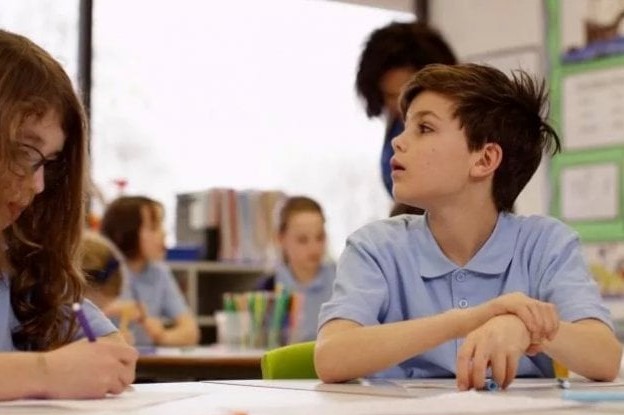
ADHD or autism? How to distinguish symptoms in children
Attention deficit hyperactivity disorder (ADHD) and autism can look a lot like each other. Children with either condition can have problems focusing. They can be impulsive or have a hard time communicating. They may have trouble with schoolwork and with relationships
Although they share many of the same symptoms, the two are distinct conditions.
Autism spectrum disorders are a series of related developmental disorders that can affect language skills, behavior, social interactions, and the ability to learn.
CHILD HEALTH: LEARN MORE ABOUT MEDICHILD BY VISITING THE BOOTH AT EMERGENCY EXPO
ADHD impacts the way the brain regulates attention and impulse control
The correct diagnosis early on helps children get the right treatment so they don’t miss out on important development and learning. People with these conditions can have successful, happy lives.
Austim and ADHD: How Are They Different?
Keep an eye on how your child pays attention.
Those with autism struggle to focus on things that they don’t like, such as reading a book or doing a puzzle.
And they may fixate on things that they do like, such as playing with a particular toy.
Kids with ADHD often dislike and avoid things they’ll have to concentrate on.
You should also study how your child is learning to communicate.
Although kids with either condition may struggle to interact with others, those with autism can have less social awareness of others around them.
They often have a hard time putting words to their thoughts and feelings, and they may not be able to point to an object to give meaning to their speech.
They find it hard to make eye contact.
A child with ADHD, on the other hand, may talk nonstop.
They’re more likely to interrupt when someone else is speaking or butt in and try to monopolize a conversation.
Also, consider the subject.
Some kids with autism can talk for hours about a topic that they’re interested in.
An autistic child usually loves order and repetition, but one with ADHD may not, even if it helps them.
A child with autism might want the same type of food at a favorite restaurant, for instance, or become overly attached to one toy or shirt.
They can become upset when routines change.
A child with ADHD doesn’t like doing the same thing again or for long times.
Diagnosis of ADHD or autism
If you think your child has either ADHD or autism, talk to your doctor about what testing you’ll need.
There’s no one thing that can say whether a child has either condition, or both.
You can start with your pediatrician, who may refer you to a specialist.
To diagnose ADHD, doctors look for a pattern of behaviors over time like being distracted or forgetful, not following through, having trouble waiting for a turn, and fidgeting or squirming.
They’ll ask for feedback from parents, teachers, and other adults that care for the child.
A doctor will also try to rule out other possible causes for the symptoms.
An autism diagnosis starts with a parent answering a questionnaire about the child, often about behaviors that started when they were very young.
Further tests and tools may include more questionnaires, surveys, and checklists, as well as interviews and observed activities.
Autism and ADHD: Treatments
It can be hard for even doctors to tell the conditions apart, but it’s important so your child gets the right treatment.
There’s no one-size-fits-all way to deal with ADHD.
Younger kids start with behavior therapy, and the doctor may prescribe medication if symptoms don’t improve enough.
Older kids will usually get both. ADHD symptoms, and their treatment, may change over time.
Different kinds of therapy — behavior, speech, sensory integration, and occupational, for example — can help kids with autism communicate and get along better.
Medicine can’t cure autism, but it may make related symptoms like difficulty focusing or high energy easier to manage.
References:
CDC: “Facts about ADHD,” “Children with ADHD,” “Autism Spectrum Disorder: Data & Statistics,” “Attention-Deficit/Hyperactivity Disorder (ADHD): Symptoms and Diagnosis,” “Autism Spectrum Disorder (ASD): Screening and Diagnosis for Healthcare Providers,” “Attention-Deficit/Hyperactivity Disorder (ADHD): Recommendations,” “Autism Spectrum Disorder (ASD): Treatment.”
Clinical Epidemiology: “Early diagnosis of autism and impact on prognosis: a narrative review.”
Pediatrics: “Timing of the Diagnosis of Attention-Deficit/Hyperactivity Disorder and Autism Spectrum Disorder.”
Frontiers in Psychiatry: “Why the Diagnosis of Attention Deficit Hyperactivity Disorder Matters.”
Autism Speaks: “Asperger Syndrome.”
Raising Children.net.au: “Learning to pay attention: children with autism spectrum disorder (ASD).”
National Institute of Deafness and Other Communication Disorders: “Autism Spectrum Disorder: Communication Problems in Children.”
Understood.org: “My Child Talks Nonstop. What Can I Do?”
The National Autistic Society: “Obsessions, repetitive behaviour and routines.”
Read Also:
Emergency Live Even More…Live: Download The New Free App Of Your Newspaper For IOS And Android
Autism, Autism Spectrum Disorders: Causes, Diagnosis And Treatment
Intermittent Explosive Disorder (IED): What It Is And How To Treat It
Management Of Mental Disorders In Italy: What Are ASOs And TSOs, And How Do Responders Act?
How Cognitive Behavioural Therapy Works: Key Points Of CBT
What Is Psychological First Aid (PFA)? The Importance Of Mental Support In Trauma Victims
Tourette Syndrome: Symptoms And How To Treat It


